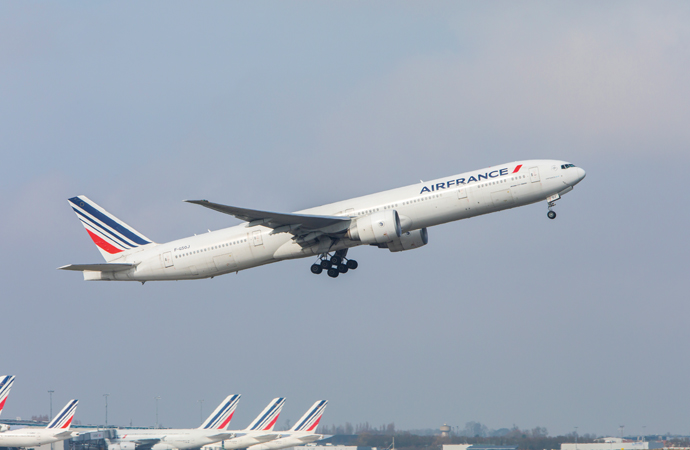[ad_1]
Air France has announced plans to stop operating almost all of its flights out of Paris Orly Airport (ORY) by the summer of 2026 due to falling demand for domestic air travel.
The French flag carrier cited several reasons for the move, including the recent surge in videoconferencing among business clients in recent years, which has led to a significant drop in demand for domestic corporate travel. It also highlighted the increasing need for domestic rail travel in France, exacerbated by the French government’s recent policy changes to combat climate change.

Air France’s Boeing 777-300 / Photo: Courtesy of Air France
“The rise of videoconferencing, the drop in domestic business travel, and the growing shift toward rail (under the combined effect of government sobriety recommendations and corporate CSR policies) are leading to a structural fall in demand on Air France’s domestic point-to-point network” said Air France in a statement.
According to Air France, passenger numbers on domestic routes out of Paris Orly dropped by around 40% between 2019 and 2023, while this number increased to about 60% for single-day return trips, highlighting the more significant impact felt by domestic business travel compared to leisure travel.
Until 2026, Air France will continue to operate flights from Paris Orly to Toulouse (TLS), Marseille (MRS), Nice (NCE), and several French Overseas territories, including Pointe-à-Pitre (PTP), Fort-de-France (FDF), Saint-Denis de la Réunion (RUN), and Cayenne (CAY).
In the meantime, the airline will boost the number of flights to these airports from Paris Charles de Gaulle (CDG), effectively moving all of its Paris operations to the capital’s principal airport.
However, one exception to the rule will be flights from Paris Orly to the island of Corsica, which will continue to be served by Air France beyond 2026 due to the airline’s joint commitment with Air Corsica to renew a Public Service Order (PSO) in 2024.
Air France’s low-cost subsidiary Transavia will continue operating out of Paris Orly after 2026. According to Air France, this is partly due to Transavia’s growing fleet of Airbus A320neo aircraft, which offer a 15% reduction in CO₂ emissions and a 50% drop in noise pollution.
The Air France Group will maintain 90% of its capacity between Paris and Toulouse, Marseille, and Nice. In contrast, its capacity between Paris and French Overseas territories will maintain current levels. The Group also reassured employees that the impact on jobs at affected domestic airports will be minimal.
“The initiative as a whole would help Air France maintain a strong brand presence in all the markets it serves, and be more responsive to rapidly changing travel demand,” said Air France. “It would optimize the use of each airline’s resources, make the offer clearer for customers and improve Air France’s competitiveness.”

Photo: High speed rail in France. Courtesy of Voyageur8 / Shutterstock
The announcement comes less than six months after the French government banned certain short-haul domestic flights. In May 2023, any short-haul domestic routes efficiently served by high-speed rail alternatives were officially forbidden in France to encourage more rail travel and reduce carbon emissions.
Domestic flights could see even more of a clampdown following this controversial decision, as the French Minister of Transport has recently suggested introducing a minimum price for airline tickets within the country. This would effectively spell the end for low-cost carriers in France, although no final decision has yet been made.
[ad_2]
Source link
